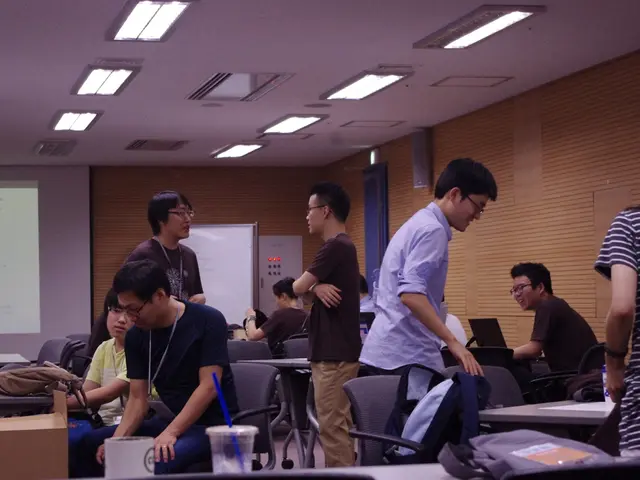Japan's Work Culture Exploration: Psychological Insights into Ikigai and Overwork
Amidst a demanding work culture, the concepts of Ikigai and overwork have gained prominence within modern Japanese society. Recognising the need for improvement, Japan is actively pursuing multiple strategies and initiatives to enhance work-life balance and promote Ikigai—a Japanese concept meaning "reason for being" or purposeful living—in the workplace.
Key measures currently underway include the expansion of parental leave and flexible work arrangements, the adoption of hybrid and remote work models, a shift towards performance-based work cultures, legal and organisational reforms for gender equity and anti-harassment, and corporate innovations.
By 2025, all parents with children under six will be able to request flexible work schedules. The government aims to increase paternity leave uptake to 50% by 2025 and 85% by 2030, encouraging more balanced family involvement and reducing overwork pressure on mothers.
Many companies are formalising hybrid work policies, with Tokyo planning a four-day workweek pilot for civil servants in 2025. Subsidies encourage rural telework to reduce commuting time and address urban depopulation. Surveys reveal that 75% of workers now prefer flexible work arrangements, signalling a shift in workplace culture toward better balance.
There is a growing movement away from valuing long working hours towards outcome-driven evaluation, which allows employees greater autonomy to manage their time and focus on efficiency rather than presenteeism. This shift supports employee well-being by reducing excessive overtime and facilitating personal priorities.
Japan is addressing systemic barriers with laws requiring companies to establish anti-harassment measures and penalizing violations. Female labor force participation has hit a historic high at 53.6%, reflecting progress toward more inclusive workplaces that support diverse wellbeing needs.
Companies like Leverages are setting positive examples by cultivating motivated workforces, using innovative HR tools, digital transformation, and international expansion to manage demographic challenges and improve productivity and satisfaction. Such organisations align employee roles with personal purpose and engagement, helping foster Ikigai within work.
Despite these efforts, Japan ranks relatively low (29th) for life-work balance among Asia-Pacific countries, partly due to limited statutory annual leave (only 10 days per year) and traditionally long work hours. However, the cultural and policy shifts described indicate a dedicated, multifaceted approach to nurturing employee well-being and sustainable work practices that reflect Ikigai principles.
Initiatives focusing on Ikigai demonstrate promising results, with employees actively engaging with their Ikigai reporting greater self-compassion and significantly reduced mental health struggles. The prevalence of burnout among Japanese employees has reached critical levels, with more than one-third of junior high school educators enduring perilous amounts of overtime.
Younger generations in Japan are increasingly rejecting the traditional salaryman lifestyle, instead prioritising personal fulfilment and self-identity. Ikigai emphasises profound personal joy, integrating passions, missions, vocations, and professions. Organisations that foster intrinsic motivation can significantly enhance employee well-being and effectively reduce the detrimental effects of excessive work pressures.
In Japan, a significant 60% of the workforce experiences substantial anxiety and stress, according to data from the Ministry of Health, Labour and Welfare (MHLW) in 2010. The phenomenon of karoshi, or death from overwork, has resulted in numerous severe health issues and work-related suicides.
Nurturing Ikigai can protect against pervasive burnout and tangibly enhance overall workplace morale. Developing corporate strategies that incorporate Ikigai principles necessitates specialized training programs for leaders, establishing supportive workplace environments, and offering robust mental health resources.
In 2017, the MHLW reported over 21,000 suicides, with approximately 9.3% directly linked to occupational stress. Cases of death from overwork (karoshi) and suicide resulting from overwork (karojisatsu) have been reported, highlighting the severe mental and physical health repercussions stemming from the demanding work ethos.
Tragic incidents such as the deaths of Miwa Sado, a 31-year-old journalist who suffered fatal heart failure after an overwhelming month during which she clocked an astounding 159 hours of overtime, and Matsuri Takahashi, a 24-year-old employee who worked 100 hours of overtime in December 2015 alone and tragically passed away, underscore the brutal expectations placed upon workers.
The concept of Ikigai plays a significant role in shaping job satisfaction for individuals in Japan, particularly when employees genuinely align their work with their Ikigai. Nurturing Ikigai is vital for both happiness and longevity, particularly evident in Okinawa, where centenarians lead remarkably purpose-driven lives.
Companies like Toyota and Hitachi have adopted Ikigai concepts to improve employee well-being and reduce burnout, such as limiting annual overtime and promoting healthier work-life balance. The Japanese work culture has evolved, with unwavering commitment and personal sacrifice being characteristic of its history. However, the ongoing focus on Ikigai and work-life balance initiatives signals a commitment to creating a more balanced and fulfilling work environment for all.
- The adoption of Ikigai concepts, such as limiting annual overtime and promoting healthier work-life balance, is a crucial step for companies like Toyota and Hitachi in improving employee mental health and reducing burnout.
- Nurturing Ikigai within workplaces is vital for enhancing employee self-compassion and significantly reducing mental health struggles, as demonstrated by initiatives focusing on Ikigai.
- Incorporating Ikigai principles into corporate strategies, through specialized training programs for leaders, establishing supportive work environments, and offering robust mental health resources, is necessary for nurturing employee well-being and improving overall workplace morale.




